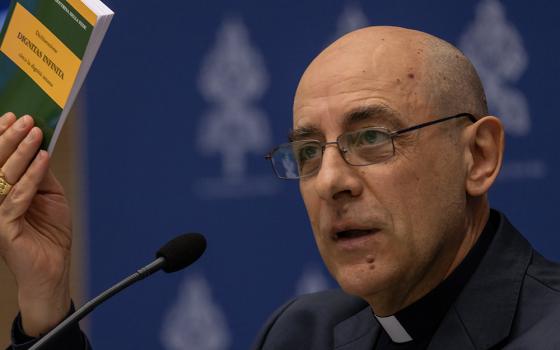
MANILA, Philippines -- A September report in Newsweek declared, "In Asia, the Philippines is the best place to be a woman" to numerous publications in the country as well as to online news and social media sites.
And yet on Thursday, International Women's Day, Manila's streets filled up with thousands of women marching and rallying in protest alongside members of partner activist groups.
International Women's Day is a global day dedicated to celebrating the economic, political and social achievements of women. It honors women in the United States and Europe who fought for their right to vote in the early 1900s, celebrates women's success and shines the spotlight on problems still to be addressed.
Gabriela, the largest organization of women in the country, led a march on Mendiola Bridge and Plaza Miranda against "unabated price hikes" in petroleum and other staple products as well as a rally to protest increasing U.S. military presence in the country. (About 6,800 Filipino and U.S. troops will hold annual combat exercises in April near disputed territories in the South China Sea.)
At Saint Joseph's College, owned by Franciscan Sisters of the Immaculate Conception, more than 200 women gathered for the Ecumenical Women's Forum for liturgy, a forum and fellowship. The forum, made up of 15 groups that work with Christians, Muslims and indigenous people, took the theme "Women Celebrating, Affirming the Continuing Struggle for Life and Human Dignity Amidst Crisis and Poverty."
Goods and crafts produced by various groups and sectors were sold during the gathering, including the book That She May Dance Again, which presents the research of Maryknoll Sr. Nila Bermisa and teams of Catholic women religious and laypeople working on violence against women in the Catholic church.
Nyrriela Atienza, 16, told the story of her mother, Terril Atienza, a dental assistant who allegedly committed suicide in December after leaving her family last year to work as a domestic helper in Singapore.
"We cannot believe it," the teenager told the gathering. "My mother wanted us to have a better life, and she knew she was our only chance for that. She would not commit suicide."
She said authorities found bruises and burns on her mother's body, which also showed clear signs of physical abuse. Philippine Overseas Employment Administration officials are scheduled to meet with the Atienza family this week.
Nyrriela, who is Catholic, told NCR her mother left for Singapore after her father lost his work as an electrician.
"My parents discussed it with us, and it was agreed she would look for work abroad because my father is not that good in English and my mother had a stronger chance to get accepted overseas," she said.
Nyrriela has since dropped out of high school to take care of her siblings, and will now work on her mother's case.
Terril Atienza's situation reflects that of many Filipino women, according to forum presenters. In 2009, there were twice as many female heads of households as in 1970, reported Xandra Bisenio of Ibon Foundation Inc., a non-stock, nonprofit development foundation established in 1978.
Ibon Foundation's research found that there were 975,000 female overseas Filipino workers as of 2010. More than half of the women worked as laborers or unskilled workers. Still, with the highest unemployment rate in Southeast Asia at 7.4 percent in the Philippines, the women are left with little choice but to look outside the country for livelihood, Bisenio said.
The Philippines government poverty-reducing cash conditional transfer program (CCT) gives cash grants to the poorest families in identified municipalities with children or to pregnant women who meet certain health and education requirements.
Its name, Pantawid Pamilyang Pilipino Program, reflects its aim to help the "Filipino family to crossover" from a state of survival to subsistence.
But Bisenio called CCT "anti-poor and anti-women," criticizing its budget increase from 10 billion pesos ($234.7 million) in 2010 to 39.5 billion ($927 million) in 2011, even though the program has not been evaluated.
She cited a study of the Center for Women Resources conducted April-July 2011 among 100 beneficiaries, most of whom said they use a large portion of the money for food and some health needs and less for education needs. Close to 60 percent of the women had no other source of income.
"Worse, CCT obtained a $805 billion loan [in American dollars] from the Asian Development Bank and the World Bank, which we will have to repay sooner or later at the expense of budget for social services," Bisenio said.
The government also has no implementation plan for after the program's scheduled end date of 2015, she said.
At the end of CCT, "Will there be ample jobs services for all?" Bisenio asked. "Will [CCT] provide agricultural support, which majority of the population of poor Filipinos will need? Will it have industries?"
Meanwhile, she cited the 2006 National Statistics Office Family Planning Survey that revealed that for every 100,000 live births in the Philippines, 162 women die during pregnancy and childbirth or shortly after childbirth.
According to the 2008 National Nutrition Survey, 26.3 percent of pregnant women and 13 percent of lactating women are underweight. The 2008 survey also found that 42.2 percent of pregnant women are anemic, as are 31.4 percent of lactating women.
Challenge to Philippine Feminist movement
 Newsweek might have named the Philippines as the best place in Asia for women, but the Philippines' feminist movement works to give all people dignity and justice, says Erlinda Perlado, executive coordinator of Women and Gender Commission of the Association of Major Religious Superiors in the Philippines, which co-organized the Ecumenical Women's Forum.
Newsweek might have named the Philippines as the best place in Asia for women, but the Philippines' feminist movement works to give all people dignity and justice, says Erlinda Perlado, executive coordinator of Women and Gender Commission of the Association of Major Religious Superiors in the Philippines, which co-organized the Ecumenical Women's Forum.
More than 20 percent of the 282 House Representatives are women, and many other females serve in the Senate, local governments and other institutions in the country. But are they employing the feminist perspective, or are they just going by male views? Perlado asks.
"Our stand is women empowerment, just relationships, equality between women and men, so that everybody will have life," she said.
It is ideal for women to remain caring and compassionate, she added.
"Without compassion and love, we could grow to be just an angry crowd, and we cannot meet all those targets we have set," Perlado said.
"Sister Nila [Bermisa] is my example," she continued, citing the author of That She May Dance Again. "She went about that book on clergy sexual abuse out of compassion and care for victimized women and obviously not out of anger."
Now after decades of the feminist movement in the country, the vision and platform for women have been announced, Perlado said. The harder task is "how to act and integrate our perspective into the culture. We cannot do that if we terrorize and condemn people."
She said she hopes for greater gender sensitivity training for all sectors, such as education and formation programs for public officials of all levels conducted by the Philippine Commission on Women.
"We want to put in our [Women and Gender Commission] calendar monthly formation, not only for nuns, but also grassroots-level church workers," Perlado said.







